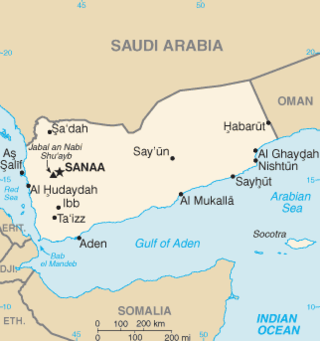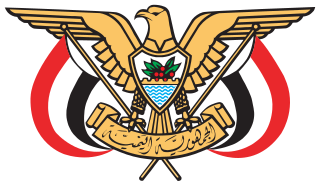
Jazan Province, also spelled Jizan is the second smallest province of Saudi Arabia. It stretches 300 km (190 mi) along the southern Red Sea coast, just north of Yemen. It covers an area of 13,457 km2 and had a population of 1,404,997 at the 2022 census. The region has the highest population density in the Kingdom. The capital is the city of Jazan; Prince Muhammad bin Nasser has been the Governor since April 2001.

Najran is a province of Saudi Arabia, located in the south of the country. It has an area of 149,511 km². Its capital is Najran.

The Saudi–Yemen barrier is a physical barrier constructed by Saudi Arabia along part of its 1,800-kilometer (1,100 mi) border with Yemen. It is a structure made of pipeline three metres (10 ft) high filled with concrete, acting as a "security barrier along sections of the now fully demarcated border with Yemen" and fitted with electronic detection equipment.

Human rights in Saudi Arabia are a topic of concern and controversy. Known for its executions of political protesters and opponents, the government of the Kingdom of Saudi Arabia has been accused of and denounced by various international organizations and governments for violating human rights within the country. An absolute monarchy under the House of Saud, the government is consistently ranked among the "worst of the worst" in Freedom House's annual survey of political and civil rights and was in 2023 ranked as the world's most authoritarian regime.

Human rights in Yemen are seen as problematic. The security forces have been responsible for torture, inhumane treatment and even extrajudicial executions. In recent years there has been some improvement, with the government signing several international human rights treaties, and even appointing a woman, Dr. Wahiba Fara’a, to the role of Minister of the State of Human Rights.

The Houthi insurgency, also known as the Houthi rebellion, the Sa'dah War, or the Sa'dah conflict, was a military rebellion pitting Zaidi Shia Houthis against the Yemeni military that began in Northern Yemen and has since escalated into a full-scale civil war. The conflict was sparked in 2004 by the government's attempt to arrest Hussein Badreddin al-Houthi, a Zaidi religious leader of the Houthis and a former parliamentarian on whose head the government had placed a $55,000 bounty.
Capital punishment in Saudi Arabia is a legal punishment, with most executions in the country being carried out by decapitation (beheading) – Saudi Arabia being the only country in the world to still use the method. In 2022, recorded executions in Saudi Arabia reached 196, the highest number recorded in the country for any year over the last three decades.

The Houthi movement, officially known as Ansar Allah, is a Shia Islamist political and military organization that emerged from Yemen in the 1990s. It is predominantly made up of Zaidi Shias, with their namesake leadership being drawn largely from the Houthi tribe.

Foreign workers in Saudi Arabia, estimated to number about 9 million as of April 2013, began migrating to the country soon after oil was discovered in the late 1930s. Initially, the main influx was composed of Arab and Western technical, professional and administrative personnel, but subsequently substantial numbers came from Southeast Asia.

The Yemeni civil war is an ongoing multilateral civil war that began in late 2014 mainly between the Rashad al-Alimi-led Presidential Leadership Council and the Mahdi al-Mashat-led Supreme Political Council, along with their supporters and allies. Both claim to constitute the official government of Yemen.

On 26 March 2015, Saudi Arabia, leading a coalition of nine countries from West Asia and North Africa, launched an intervention in Yemen at the request of Yemeni president Abdrabbuh Mansur Hadi, who had been ousted from the capital, Sanaa, in September 2014 by Houthi insurgents during the Yemeni Civil War. Efforts by the United Nations to facilitate a power sharing arrangement under a new transitional government collapsed, leading to escalating conflict between government forces, Houthi rebels, and other armed groups, which culminated in Hadi fleeing to Saudi Arabia shortly before it began military operations in the country.
On 24 July 2015, between 9:30 and 10:00 p.m., the city of Mokha, Yemen, was bombed by the Saudi Arabian led coalition. The airstrikes struck two worker housing complexes for engineers and technicians at the Mokha steam power plant. The attack left between 65 and 120 dead, including at least 10 children.

The Houthi–Saudi Arabian conflict is an ongoing armed conflict between the Royal Saudi Armed Forces and Iran-backed Yemeni Houthi forces that has been taking place in the Arabian Peninsula, including the southern Saudi regions of Asir, Jizan, and Najran, and northern Yemeni governorates of Saada, Al Jawf, and Hajjah, since the onset of the Saudi Arabian-led intervention in Yemen in 2015.

War crimes and human rights violations, committed by all warring parties, have been widespread throughout the Yemeni civil war. This includes the two main groups involved in the ongoing conflict: forces loyal to the current Yemeni president, Abdrabbuh Mansur Hadi, and Houthis and other forces supporting Ali Abdullah Saleh, the former Yemeni president. Al-Qaeda in the Arabian Peninsula and the Islamic State of Iraq and the Levant have also carried out attacks in Yemen. The Saudi-led coalition, backed by the United States and other nations, has also been accused of violating human rights and breaking international law, especially in regards to airstrikes that repeatedly hit civilian targets.

The General Directorate of Border Guard is a Saudi agency responsible for guarding land and sea borders of the Kingdom. Awwad Eid Al-Aradi Al-Balawi is the Directorate general of Saudi Arabian Border Guards.

The Saudi Arabia–Yemen border is 1,307 km (812 mi) in length and runs from the Red Sea coast in the west to the tripoint with Oman in the east.

The Mai Kadra massacre was a massacre and ethnic cleansing carried out during the Tigray War on 9–10 November 2020 in the town of Mai Kadra in Welkait in northwestern Ethiopia, near the Sudanese border. Responsibility was attributed to a pro-TPLF youth group and forces loyal to the Tigray People's Liberation Front (TPLF) in the EHRC-OHCHR Tigray Investigation, preliminary investigations by Amnesty International, the Ethiopian Human Rights Commission (EHRC) and the Ethiopian Human Rights Council (EHRCO), and interviews conducted in Mai Kadra by Agence France-Presse. The Office of the United Nations High Commissioner for Human Rights (OHCHR) and EHRC reported that at least 5 Tigrayans were killed in Mai Kadra by Amhara militas such as Fano in retaliation. Tigrayan refugees in Sudan told multiple news outlets that Tigrayans in Mai Kadra were targeted by either Amhara militias, the Ethiopian National Defense Force (ENDF), or both.
Events in the year 2021 in Saudi Arabia.












